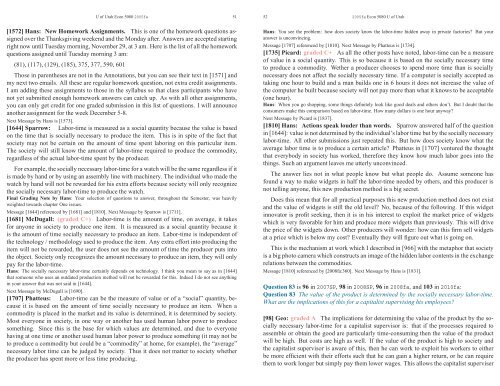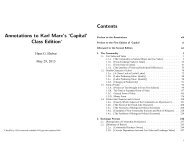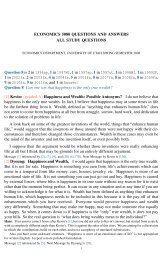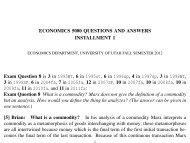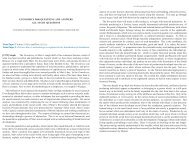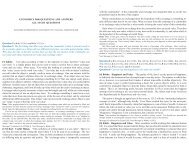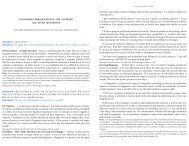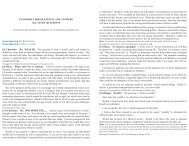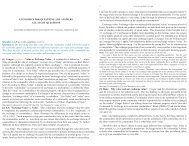Question 1 What did Marx mean with his formu - University of Utah
Question 1 What did Marx mean with his formu - University of Utah
Question 1 What did Marx mean with his formu - University of Utah
You also want an ePaper? Increase the reach of your titles
YUMPU automatically turns print PDFs into web optimized ePapers that Google loves.
U <strong>of</strong> <strong>Utah</strong> Econ 5080 2005fa 51<br />
[1572] Hans: New Homework Assignments. T<strong>his</strong> is one <strong>of</strong> the homework questions assigned<br />
over the Thanksgiving weekend and the Monday after. Answers are accepted starting<br />
right now until Tuesday morning, November 29, at 3 am. Here is the list <strong>of</strong> all the homework<br />
questions assigned until Tuesday morning 3 am:<br />
(81), (117), (129), (185), 375, 377, 590, 601<br />
Those in parentheses are not in the Annotations, but you can see their text in [1571] and<br />
my next two emails. All these are regular homework question, not extra credit assignments.<br />
I am adding these assignments to those in the syllabus so that class participants who have<br />
not yet submitted enough homework answers can catch up. As <strong>with</strong> all other assignments,<br />
you can only get credit for one graded submission in t<strong>his</strong> list <strong>of</strong> questions. I will announce<br />
another assignment for the week December 5-8.<br />
Next Message by Hans is [1573].<br />
[1644] Sparrow: Labor-time is measured as a social quantity because the value is based<br />
on the time that is socially necessary to produce the item. T<strong>his</strong> is in spite <strong>of</strong> the fact that<br />
society may not be certain on the amount <strong>of</strong> time spent laboring on t<strong>his</strong> particular item.<br />
The society will still know the amount <strong>of</strong> labor-time required to produce the commodity,<br />
regardless <strong>of</strong> the actual labor-time spent by the producer.<br />
For example, the socially necessary labor-time for a watch will be the same regardless if it<br />
is made by hand or by using an assembly line <strong>with</strong> machinery. The individual who made the<br />
watch by hand will not be rewarded for <strong>his</strong> extra efforts because society will only recognize<br />
the socially necessary labor-time to produce the watch.<br />
Final Grading Note by Hans: Your selection <strong>of</strong> questions to answer, throughout the Semester, was heavily<br />
weighted towards chapter One issues.<br />
Message [1644] referenced by [1681] and [1810]. Next Message by Sparrow is [1711].<br />
[1681] McDugall: (graded C+) Labor-time is the amount <strong>of</strong> time, on average, it takes<br />
for anyone in society to produce one item. It is measured as a social quantity because it<br />
is the amount <strong>of</strong> time socially necessary to produce an item. Labor-time is independent <strong>of</strong><br />
the technology / methodology used to produce the item. Any extra effort into producing the<br />
item will not be rewarded, the user does not see the amount <strong>of</strong> time the producer puts into<br />
the object. Society only recognizes the amount necessary to produce an item, they will only<br />
pay for the labor-time.<br />
Hans: The socially necessary labor-time certainly depends on technology. I think you <strong>mean</strong> to say as in [1644]<br />
that someone who uses an outdated production method will not be rewarded for t<strong>his</strong>. Indeed I do not see anything<br />
in your answer that was not said in [1644].<br />
Next Message by McDugall is [1690].<br />
[1707] Phatteus: Labor-time can be the measure <strong>of</strong> value or <strong>of</strong> a “social” quantity, because<br />
it is based on the amount <strong>of</strong> time socially necessary to produce an item. When a<br />
commodity is placed in the market and its value is determined, it is determined by society.<br />
Most everyone in society, in one way or another has used human labor power to produce<br />
something. Since t<strong>his</strong> is the base for which values are determined, and due to everyone<br />
having at one time or another used human labor power to produce something (it may not be<br />
to produce a commodity but could be a “commodity” at home, for example), the “average”<br />
necessary labor time can be judged by society. Thus it does not matter to society whether<br />
the producer has spent more or less time producing.<br />
52 2005fa Econ 5080 U <strong>of</strong> <strong>Utah</strong><br />
Hans: You see the problem: how does society know the labor-time hidden away in private factories? But your<br />
answer is unconvincing.<br />
Message [1707] referenced by [1810]. Next Message by Phatteus is [1734].<br />
[1735] Picard: graded C+ As all the other posts have noted, labor-time can be a measure<br />
<strong>of</strong> value in a social quantity. T<strong>his</strong> is so because it is based on the socially necessary time<br />
to produce a commodity. Wether a producer chooses to spend more time than is socially<br />
necessary does not affect the socially necessary time. If a computer is socially accepted as<br />
taking one hour to build and a man builds one in 6 hours it does not increase the value <strong>of</strong><br />
the computer he built because society will not pay more than what it knows to be acceptable<br />
(one hour).<br />
Hans: When you go shopping, some things definitely look like good deals and others don’t. But I doubt that the<br />
consumers make t<strong>his</strong> comparison based on labor-time. How many dollars is one hour anyway?<br />
Next Message by Picard is [1837].<br />
[1810] Hans: Actions speak louder than words. Sparrow answered half <strong>of</strong> the question<br />
in [1644]: value is not determined by the individual’s labor time but by the socially necessary<br />
labor-time. All other submissions just repeated t<strong>his</strong>. But how does society know what the<br />
average labor time is to produce a certain article? Phatteus in [1707] ventured the thought<br />
that everybody in society has worked, therefore they know how much labor goes into the<br />
things. Such an argument leaves me utterly unconvinced.<br />
The answer lies not in what people know but what people do. Assume someone has<br />
found a way to make widgets in half the labor-time needed by others, and t<strong>his</strong> producer is<br />
not telling anyone, t<strong>his</strong> new production method is a big secret.<br />
Does t<strong>his</strong> <strong>mean</strong> that for all practical purposes t<strong>his</strong> new production method does not exist<br />
and the value <strong>of</strong> widgets is still the old level? No, because <strong>of</strong> the following. If t<strong>his</strong> widget<br />
innovator is pr<strong>of</strong>it seeking, then it is in <strong>his</strong> interest to exploit the market price <strong>of</strong> widgets<br />
which is very favorable for him and produce more widgets than previously. T<strong>his</strong> will drive<br />
the price <strong>of</strong> the widgets down. Other producers will wonder: how can t<strong>his</strong> firm sell widgets<br />
at a price which is below my cost? Eventually they will figure out what is going on.<br />
T<strong>his</strong> is the mechanism at work which I described in [966] <strong>with</strong> the metaphor that society<br />
is a big photo camera which constructs an image <strong>of</strong> the hidden labor contents in the exchange<br />
relations between the commodities.<br />
Message [1810] referenced by [2008fa:360]. Next Message by Hans is [1831].<br />
<strong>Question</strong> 83 is 96 in 2007SP, 98 in 2008SP, 96 in 2008fa, and 103 in 2010fa:<br />
<strong>Question</strong> 83 The value <strong>of</strong> the product is determined by the socially necessary labor-time.<br />
<strong>What</strong> are the implications <strong>of</strong> t<strong>his</strong> for a capitalist supervising <strong>his</strong> employees?<br />
[98] Geo: graded A The implications for determining the value <strong>of</strong> the product by the socially<br />
necessary labor-time for a capitalist supervisor is: that if the processes required to<br />
assemble or obtain the good are particularly time-consuming then the value <strong>of</strong> the product<br />
will be high. But costs are high as well. If the value <strong>of</strong> the product is high to society and<br />
the capitalist supervisor is aware <strong>of</strong> t<strong>his</strong>, then he can work to exploit <strong>his</strong> workers to either<br />
be more efficient <strong>with</strong> their efforts such that he can gain a higher return, or he can require<br />
them to work longer but simply pay them lower wages. T<strong>his</strong> allows the capitalist superviser


